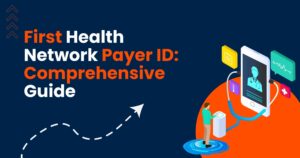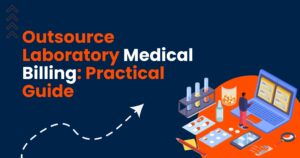In the fast-paced world of healthcare, keeping track of money is just as important as taking care of patients. Accounts Receivable (AR) is a highly essential part of the revenue cycle. If you’ve ever asked yourself, “What is AR in medical billing?” This tutorial will provide you a clear and full answer.
In medical billing, AR is the money that patients or insurance companies owe healthcare providers for services they have already given. Good AR management makes sure that providers get paid on time, which decreases their stress and enables them to focus on taking care of patients instead of chasing payments.
What Does AR Mean in Medical Billing?
Accounts Receivable is the full name for AR in medicine. It’s the amount of money that healthcare providers still need to get paid. This includes claims that haven’t been paid yet, payments from patients that are still waiting, or reimbursements that are late.
When people send in claims, insurance companies don’t normally pay them right away. They can be turned down, delayed, or need further paperwork. This is where AR management comes into play in medical billing. It ensures that providers follow up on claims, rectify denials, and get paid on schedule.
Why Accounts Receivable in Medical Billing Is Important
For any healthcare organization to be financially healthy, medical accounts receivable is highly vital. Providers can run into cash flow problems if they don’t handle their accounts receivable well, which can hurt their daily operations and long-term stability. This is why it’s important:
- Cash Flow Stability: This makes sure that suppliers always have enough money to pay for salaries, equipment, and other costs.
- Fewer Denied Claims: Good AR follow-up cuts down on delays due by mistakes or missing information.
- Patient Satisfaction: A straightforward billing process makes it easier for individuals to understand what they need to do.
- Better Efficiency: Easier AR processes make work easier and cut down on the quantity of work that needs to be done.
In short, how well a medical practice functions as a whole depends on how effectively it manages its accounts receivable in healthcare.
AR Management in Medical Billing: How It Works
Getting paid for unpaid claims is just one component of AR medical billing; it’s a comprehensive process. Here are the most critical things to do while handling medical billing accounts receivable:
-
Putting in a claim
The claim is made and sent to the insurance company after the patient gets treatment.
-
Keeping an eye on claims
The AR team checks on the claim’s status to make sure it’s being worked on.
-
Denial Management
If the claim is denied or rejected, AR specialists discover why, repair any mistakes, and send it back in.
-
Billing for Patients
The patient is charged immediately for any sum that is past due.
-
Making Payments
The system keeps track of payments from both patients and insurance companies in a way that is correct.
-
Follow Up
Following up all the time makes sure that every claim is answered, which stops money from slipping out.
Common Challenges in Medical Accounts Receivable
In healthcare, it might be hard to maintain track of accounts receivable. Some of the most common issues are:
- Claim Denials: Delays occur when there are errors in patient information, coding, or missing paperwork.
- Late Payments: Insurance companies don’t always pay claims right away.
- Patients not paying: Patients may not pay their bills or may put them off.
- Administrative Burden: Providers may have to work hard to maintain track of all the claims.
Many clinics employ medical accounts receivable services to handle AR management for them so they may spend more time with patients.
How AR Management Improves the Revenue Cycle
Strong accounts Billing for receivables directly helps the healthcare revenue cycle. Here are some benefits:
- Faster payouts for claims
- Less saying no and denying
- More steady cash flow
- Less stress about money for providers
- More time to look after patients
When healthcare providers hire professionals to handle their medical billing accounts receivable, they get paid faster and follow the standards for healthcare.
MDHELPTEK: Your Partner in Medical Accounts Receivable Management
MDHELPTEK knows that medical professionals need to be good with money. That’s why we focus on managing AR in medical billing: to make sure you don’t lose money because of mistakes, denials, or delays.
For medical accounts receivable, we conduct the following:
- Keeping track of unpaid claims and patient balances
- Fixing claim denials quickly
- Making sure that claims are sent in the right way
- Following up on payments that are still owed
- Improving the complete process of selling
By collaborating with MDHelpTek, healthcare practitioners may be able to spend less time on paperwork, make more money, and focus on giving effective care.
Other Services by MDHelpTek to Support Your Revenue Cycle
MDHELPTEK offers a number of services that help things move more easily and quickly, in addition to AR in medical billing:
Checking coverage and gaining pre-approval from insurance companies before treatment helps avoid denials and speeds up payment.
Making it easy for staff to refer patients makes sure that care continues and makes things easier for staff.
When you add our medical accounts receivable service to these services, you have a complete solution for the finances and operations of healthcare practices.
Why Choose MDHelpTek for AR Medical Billing?
This is why healthcare providers let us handle their medical billing accounts receivable:
- Our crew knows a lot about billing and accounts receivable administration in the healthcare area.
- We employ the latest tools to quickly keep track of, watch over, and follow up on claims.
- We make sure that all of our processes satisfy HIPAA and healthcare laws.
- We make sure that our services match the demands of each provider, as they are all distinct.
- Our clients get paid faster, have fewer denials, and have more money coming in.
Conclusion
So, what does AR stand for in medical billing? In short, it’s the money that doctors and nurses are waiting to get for their work. Practices that don’t have effective accounts receivable billing can have late payments, claims that aren’t allowed, and finances that aren’t steady.
That’s why MDHelpTek offers specialized medical accounts receivable services, as well as Pre-Authorizations Services and Referral Coordination Services, to aid your clinic from beginning to end.
Today, collaborate with MDHelpTek to make more money, obtain fewer denials, and make your billing process easier.





